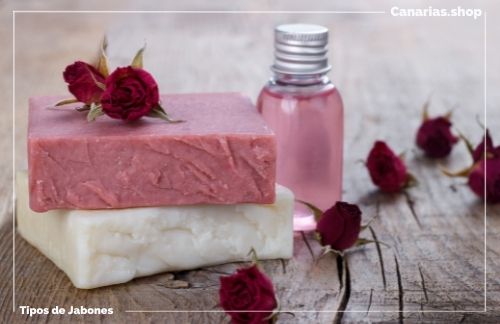Types of Soap
We could say that of all the products we have at home, soap is one of the most used given its great utility to maintain cleanliness and hygiene at a personal level and in the rest of the home. But there are a lot of types of soaps, which have different origins and today we will discover them.
What is soap?
Soap is a compound that has been discovered for thousands of years and is used for cleaning not only our body, but the surfaces of our home and our clothes.
But soap is made up of different substances that give it the consistency it has and that allows it to remove dirt.
These components are usually an alkali and a lipid, which when mixed obtain this consistency and cause a reaction called saponification. According to the concentration in which these compounds are mixed, they can have a liquid, solid or powdered state.
However, in order for it to perform its cleaning function, it must be mixed with water or some liquid component that activates the cleaning effect of it.

Origin of soap
It is believed that the origin of soap dates back thousands and thousands of years, as there is archaeological evidence that suggests its use in early cultures. In fact, it is believed that its discovery was made by the Romans.
These, used to make sacrifices of animals in Mount Sapo, the fat of the animal blood descended by the river along with the ashes of the large bonfires that they made, this made the water of the same had a different consistency.
The slaves realized this effect and that when washing their clothes they were cleaner than with any other water and thus discovered how to make soap.
Most important types of soap
Today there are different types of soap that differ in their texture, in the types of base fatty acids used for their preparation, their fragrance and other factors. Below we will show you the different types of soap used at the cosmetic level today.

Marseille soap
Marseille soap is one of the best known since ancient times. It is said that this soap is made since the Middle Ages in the South of France. It is a soap made from olive oil, although it can include other types of vegetable oils.
This oil has many benefits, among which are its healing, repairing, antiseptic and home care properties.
You can find in our online store the best natural and handmade soaps
Castile Soap
Castile soap is also one of the oldest known soaps. This soap is made from olive vegetable oil and unlike Marseille soap, this one does not contain any other vegetable oil.
Its name is due to the fact that in the Modern Age it was made and exported from the Crown of Castile. At present, it is made by hand and has endless benefits for the skin and hair.
Portuguese blue and white soap
Portuguese soap is one of the best known worldwide since its creation a few centuries ago. This soap can be in white or blue, and its presentation is in a square tablet.
It has the particularity of being one of the strongest and with the greatest detergent effect. It is generally used to wash our garments for the ability to undo dirt, however beneficial properties are also known for personal use, such as the removal of spots on the skin, healing, etc.

Pitch soap
Pitch soap was widely known a few years ago and although today it is not as famous as in its beginnings, this soap is still recommended by some naturists for skin, hair and scalp conditions.
This soap is made from olive oil and coal pitch, which gives it a very characteristic dark coloration. It is excellent for fighting dryness and even skin infections.
Aleppo soap
Aleppo soap comes from this locality in Syria, and was brought to Europe many years ago, at the time of the Crusades. It is made from bay oil and as a complement, olive oil.
It has a very characteristic smell and a coloration between beige and green inside and has properties used mainly for skin conditions such as acne and psoriasis.

Vegetable oil soap
It is a characteristic soap since it is not made from vegetable oils as in the previous cases, but from animal fat. At first it was made of car fat, as pork is known in America, however today it can be found mostly, made from fat of beef origin.
Its presentation is usually spherical and can vary in terms of its size, color and even its fragrance.
Properties of soap
Soap has certain properties that characterize it and give it the cleansing effect for which it is known. Here are some of them.
Chemical composition
As we mentioned at the beginning of this article, to get the saponification effect that makes soap soap, two basic components are required: an alkali and a lipid or fatty acid. By joining these two elements and saponifying, detergent properties are obtained.

Smell
Depending on its origin and elaboration, soap may or may not have an odor. In some cases, such as neutral soap, it does not usually have any type of smell, however in most cases, a fragrance is added that can come from essential oils or artificial substances.
Removes grease and dirt
Thanks to its detergent characteristic, soap is able to remove grease and dirt, purify and clean different surfaces, from the skin, hair, clothes and any solid surface of our home.

Benefits on the skin
Some handmade soaps contain glycerin as the main component. This element has excellent properties on the skin, which eliminates dryness and helps fight spots or problems in it.
Take care of the environment
In the case of natural or artisanal soaps, most of them do not have an impact on the environment, since their preparation does not include chemical elements that can damage the ozone layer.
